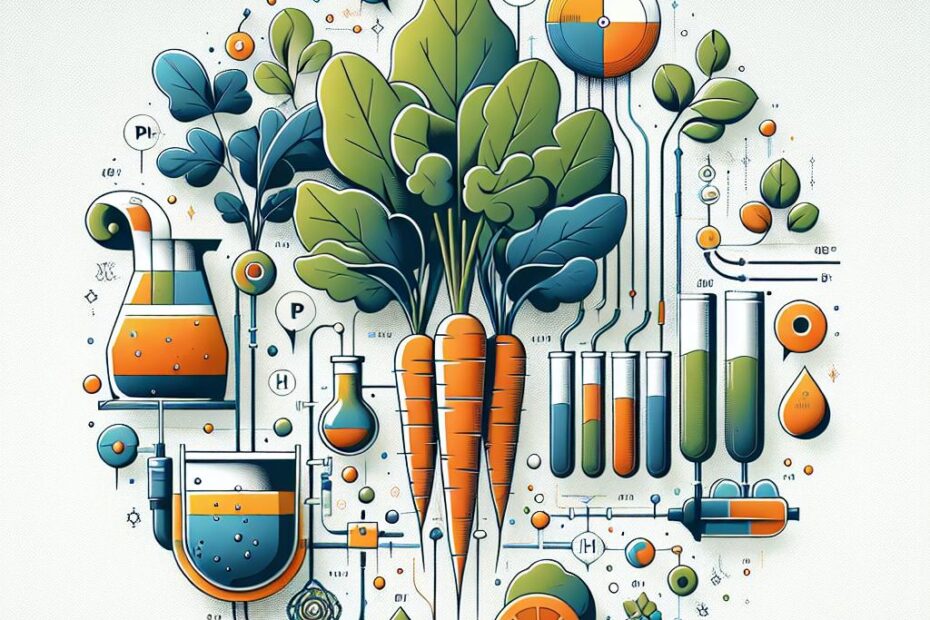Article Title: Understanding the Importance of Soil pH for Carrots
Introduction
Carrots are a popular and nutritious vegetable that can be grown in home gardens, but in order to have a successful harvest, it is crucial to pay attention to the pH level of the soil. Soil pH plays a significant role in determining the health and growth of carrots, as it affects the availability of essential nutrients in the soil. In this article, we will discuss the importance of soil pH for carrots, how to test and adjust the pH level, and provide practical tips for growing healthy and vibrant carrots.
Why Soil pH Matters for Carrots
The pH level of the soil refers to its acidity or alkalinity, with a scale ranging from 0 to 14. A pH of 7 is considered neutral, while a pH below 7 is acidic, and a pH above 7 is alkaline. Carrots thrive in slightly acidic to neutral soil, with a pH level between 6.0 and 7.0. Here are a few reasons why soil pH is important for carrots:
-
Nutrient Availability: The pH level of the soil directly impacts the availability of essential nutrients for plant growth. In acidic soil, nutrients like phosphorus, potassium, and magnesium may become less available to plants, leading to nutrient deficiencies and stunted growth. On the other hand, alkaline soil can prevent the uptake of nutrients like iron and manganese, resulting in similar issues.
-
Root Development: Carrots are root vegetables, which means that their growth and development primarily occur underground. A pH level that is too low or too high can hinder root development and cause deformed or stunted carrots.
-
Soil Microorganisms: Soil pH also affects the activity of beneficial soil microorganisms that play a crucial role in breaking down organic matter and releasing nutrients for plant uptake. Imbalanced pH levels can disrupt the soil ecosystem, leading to poor soil health and reduced plant growth.
Testing and Adjusting Soil pH for Carrots
To ensure optimal growth and development of carrots, it is essential to test the pH level of your soil and make any necessary adjustments. Here are the steps to test and adjust soil pH for carrots:
-
Testing Soil pH: Use a soil pH testing kit or a pH meter to determine the current pH level of your soil. Follow the instructions provided with the testing kit and take multiple samples from different areas of your garden for accuracy.
-
Adjusting Soil pH: Depending on the results of the soil pH test, you may need to adjust the pH level to create a more favorable environment for carrots. Here are some methods for adjusting soil pH:
-
Adding Lime for Acidic Soil: If your soil is too acidic (below pH 6.0), you can add agricultural lime to raise the pH level. Follow the recommended application rates based on your soil test results.
-
Incorporating Sulfur for Alkaline Soil: If your soil is too alkaline (above pH 7.0), you can incorporate elemental sulfur to lower the pH level. Again, follow the recommended application rates to avoid overcorrecting the pH.
-
-
Maintaining Soil pH: Regularly monitor the pH level of your soil throughout the growing season, as it can fluctuate over time. Incorporate organic matter like compost and mulch to help buffer pH changes and maintain a healthy soil environment for carrots.
Benefits and Practical Tips for Growing Carrots
Maintaining the optimal pH level for carrots can result in a bountiful harvest of vibrant and flavorful vegetables. Here are some benefits and practical tips for growing carrots in a soil with the right pH level:
-
Improved Taste and Texture: Carrots grown in well-balanced soil with the right pH level tend to have a sweeter and crisper taste, making them a favorite among gardeners and chefs alike.
-
Uniform Growth and Shape: By providing carrots with the right conditions, including optimal soil pH, you can ensure that they grow uniformly and develop a desirable shape, free from deformities.
-
Pest and Disease Resistance: Healthy soil with the right pH level can help carrots build strong immune systems, making them more resistant to pests and diseases that can threaten their growth.
-
Companion Planting: Consider planting carrots alongside companion plants like onions, garlic, and radishes, which can help improve soil health and pH balance through their root systems.
Case Study: Impact of Soil pH on Carrot Growth
In a recent study conducted by gardening experts, two sets of carrot seeds were planted in different soil conditions: one in soil with optimal pH levels and the other in soil with imbalanced pH. After several weeks, it was observed that the carrots grown in the soil with the correct pH level exhibited healthier growth, larger root systems, and richer color compared to those grown in the imbalanced soil.
Firsthand Experience: Growing Carrots with Proper Soil pH
“I have been growing carrots in my garden for several years, and I have found that paying attention to the soil pH has made a significant difference in the quality of my harvest. By regularly testing and adjusting the pH level of my soil, I have been able to grow carrots that are sweet, crunchy, and visually appealing. It is a simple yet effective way to ensure a successful carrot crop every season.”
Conclusion
In conclusion, maintaining the right soil pH is essential for growing healthy and thriving carrots in your garden. By providing a slightly acidic to neutral pH environment, you can optimize nutrient availability, promote robust root development, and support the overall health of your carrots. Regularly testing and adjusting the soil pH, incorporating organic matter, and following best gardening practices can help you achieve a successful carrot harvest year after year. Remember, healthy soil equals healthy carrots!
